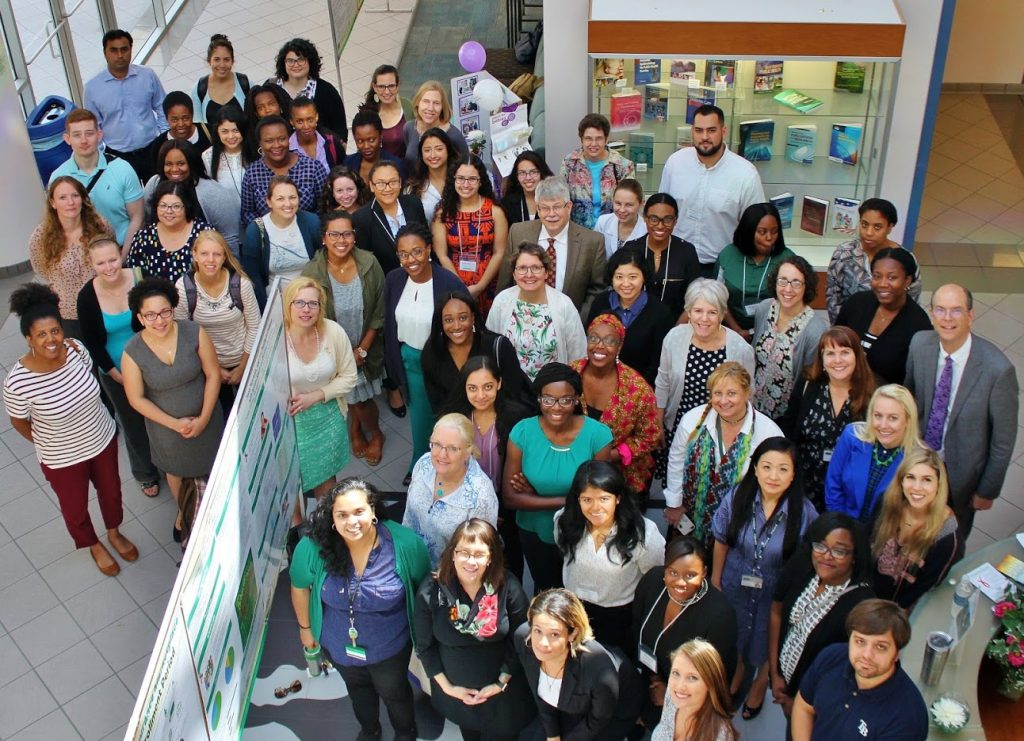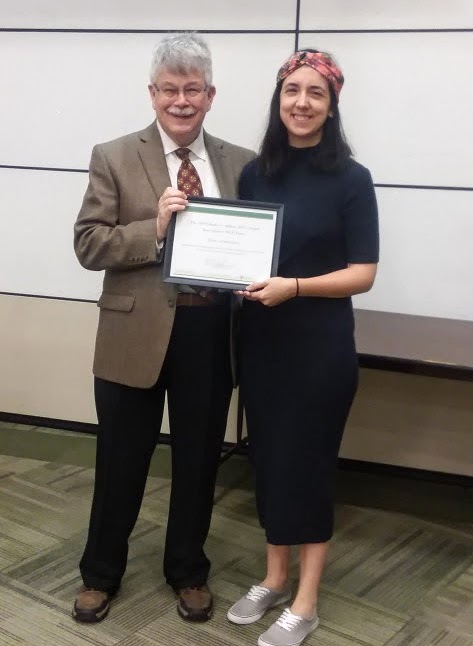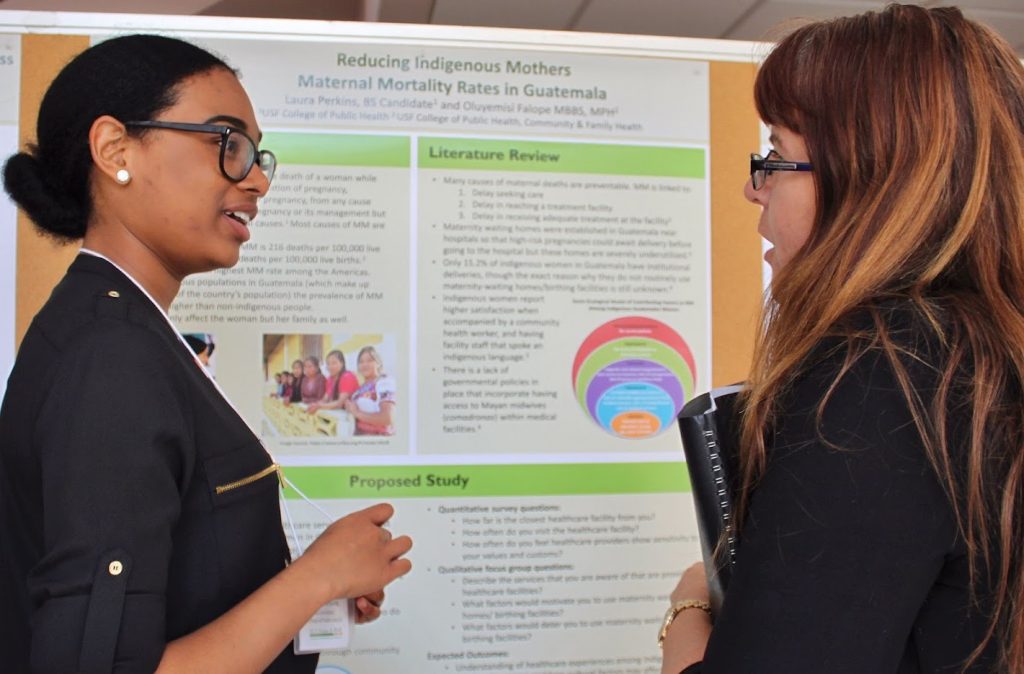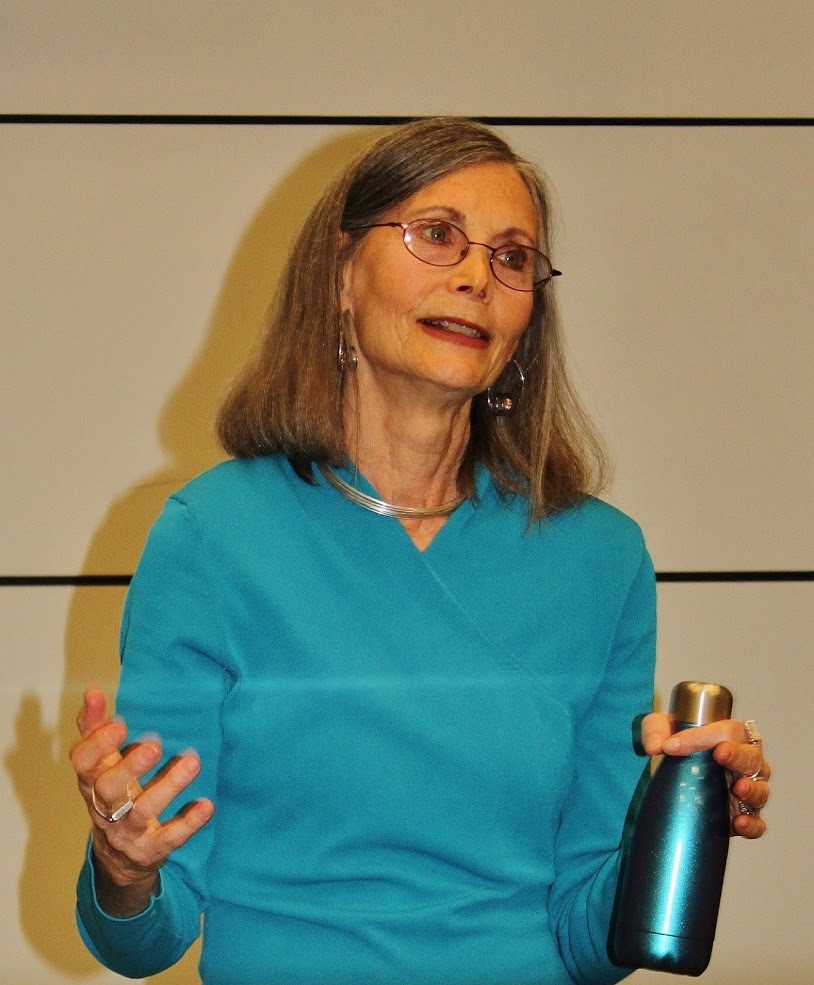Annual Chiles Symposium showcases efforts to improve community health
For the second year now, the Annual Chiles Lecture and Symposium put a spotlight on how the USF College of Public Health is promoting the health and well-being of women, children, families and communities.

The 2018 Annual Chiles Symposium took place at the USF College of Public Health this year. (Photo by Ellen Kent)
The COPH’s Chiles Center aims to promote the optimal health using a multi-pronged approach: research, applying evidence-based practices, delivering education and guiding change through service and partnership.
And this year’s 2018 Annual Chiles Lecture and Symposium on April 6 highlighted the ways faculty, staff and students are doing just that.
“Starting last year, the Chiles Symposium provides Chiles Center faculty, students and staff the opportunity to showcase and discuss the breadth and depth of their research and research to practice for women, children and families,” said Dr. William Sappenfield, professor of community and family health and director of the Chiles Center. “It is a great forum given the large number of active members including our new undergraduates as part of the MCH Pipeline program. This year’s presentations and posters were outstanding.”
The Charles S. Mahan, M.D. Award for Best Student MCH Paper was also presented to doctoral student Silvia Sommariva. This award recognizes the best paper authored by a College of Public Health student on maternal and child health by providing a $500 award.

Dr. Russell Kirby presented the Charles Mahan MCH Best Student Paper Award to doctoral student Silvia Sommariva. (Photo by Dr. Jennifer Marshall)
Her paper, “Spreading the (Fake) News: Exploring Health Messages on Social Media and the Implications for Health Professionals Using a Case Study,” was just accepted for publication by the American Journal of Health Education.
“Winning the C.S. Mahan MCH Best Student Paper Award was indeed a great honor and I am very thankful to the committee for choosing this study on the role of ‘fake news’ in health education practice using Zika Virus as a case example,” she said. “This recognition definitely motivated me to continue this line of research. I would like to also thank my co-authors for their support and work on this paper.”
Co-authors on her paper are Dr. Cheryl Vamos, Alexios Mantzarlis, Lillie Uyên-Loan Đào, and Dinorah Martinez Tyson.
Other topics presented this year included:
Florida Health Babies: This is how “we” do it
Barr, A. Best, and C. Parvanta
Baby’s Best Sleep
Fross, A. McMahon, D. Rojas, V. Ciceron, E. Campos, T. Obioha, and J. Marshall
Supplementation and weaning at 1-month post-partum due to perceived milk insufficiency: risk factors for WIC participants
Roig-Romero, E. Schafter, A. Barr, W. Wang, T. Livingston, M. Wachira, and S. Marhefka
NAS and Future Research to Practice Opportunities
Kirby, J.P. Tanner, J. Salemi, D. Sampat, J. Marshall, T. Foti, C. Reid, and W.M. Sappenfield
Florida Early Childhood Comprehensive Systems (ECCS) Impact Project: Evaluation Strategies for Place-Based Initiatives to Improve Child Development
Delva, C. Ade, C. Geffrard, T. Bello, C. Apollon, E. Dias, and J. Marshall
Dietary intakes, mealtime behaviors and nutritional challenges of children with autism spectrum disorder in Florida
Webber, H. Gray, C. Robinson, B. Anuforo, and S. Sinha
FL-CKF Strategic Outreach Tactics During Special Enrollment Period
Parrillo, K. Roders Turner, S. Vazquez
Following presentations and awards, all attending guests and speakers were invited to view research posters, network with potential colleagues, and meet the authors.

COPH student Laura Perkins shares her research findings during the poster presentation portion of the event. (Photo by Ellen Kent)
Dr. Paula Braveman, a leading national expert on health equity and professor of family community medicine at the University of California San Francisco, closed the event with a keynote discussion.
She discussed barriers to achieving optimal health faced by low-income, minority and disadvantaged populations in her address, “To Achieve Health Equity We Must Go (Even Farther) Upstream.”
While medical care is a vital component to health, Braveman discussed the need for improved living conditions, better wages, and educational attainment to improve health.
“As income goes up, health improves,” Braveman said. “Wealth of parents affects educational attainment and occupations of children.”

Paula Braveman, MD, MPH. (Photo by Ellen Kent)
Braveman discussed how education is linked to the ability to cope and respond to stress, and how stress impacts health equity as well.
She closed her talk with the urgency to examine health equity through addressing social determinants of health, including reducing poverty, segregation (which leads to areas with poorer schools), discrimination, and investing in healthier homes, neighbors, schools and workplaces.
“Chronic stress is toxic and impacts chronic disease in adulthood,” she said. “We must engage in advocacy to change what’s happening upstream.”
Related media:
Album by Ellen Kent.
Story by Anna Mayor, USF College of Public Health
